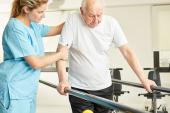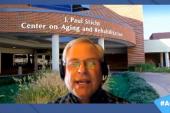Mobile Health for Cardiac Rehab Doesn’t Aid Older Adults With CVD: RESILIENT
An app-based program failed to boost function for most at 3 months, but positive signs were seen in women and after CABG.

Older adults who’ve been hospitalized for ischemic heart disease don’t see any improvement in function, quality of life, or angina symptoms when given a 3-month mobile health intervention for cardiac rehab, according to results of the RESILIENT trial.
That said, the app- and phone-based program did appear to boost 6-minute walk distance (6MWD) among women and in patients who’d recently undergone CABG surgery, researchers reported recently in JAMA Network Open.
Lead author John A. Dodson, MD, MPH (NYU Langone Health, New York, NY), noted that there’s much room for improvement when it comes to promoting cardiac rehab. “Cardiac rehab is something that we know works. There’s a lot of evidence behind it,” he said. “And we also know that it is underutilized. We have some centers only referring 25% of eligible patients.” In the best-case scenario, Dodson added, 75% of patients with ischemic heart disease receive this care.
The hope when embarking on RESILIENT was that a mobile approach might remove some of the barriers for older adults, who might have difficulty obtaining in-person rehab, he said. Although there had been some positive data to support digital tools in this scenario, very little evidence existed in the elderly population.
This hope did not bear fruit, however. Dodson said this might be due to the app itself. “If it’s not designed with the older patient in mind, they might use it and get frustrated and stop, or they might not use it at all,” he said.
This same sort of variability was seen in the RESILIENT participants. “We don’t know exactly why, but we’re trying to understand that better,” said Dodson.
RESILIENT
For RESILIENT, researchers enrolled 400 patients ages 65 and older (median age 71.0 years; 72.8% male) from five academic hospitals in New York, Connecticut, and Massachusetts between January 2020 and April 2024, randomizing them 3:1 to receive the mobile intervention for cardiac rehab or usual care for 3 months. All participants had had a recent hospital stay for either acute MI or coronary revascularization, either PCI or CABG. Patients in both groups had the option to also receive traditional cardiac rehab at their cardiologist’s discretion.
For the trial, the investigators purchased mHealth-CR (Moving Analytics), a commercially available software. The study intervention consisted of three components: a tablet equipped with the software, weekly counseling by an exercise therapist via telephone, and remote physiologic monitoring.
In the intervention group, patients used the software a median of three times per week and had a median of 10.5 telephone calls with an exercise therapist. They walked a median of 6,157 steps per day, with three-quarters averaging 150 minutes of exercise on a weekly basis. Generally, however, engagement with the program declined over time.
Eighty-nine percent of the trial’s patients returned at 3 months to be tested for their change in 6MWD from baseline, the study’s primary outcome. Adjusted for potential confounders, including study site, there was no difference in 6MWD overall. But there were signs of improvement with mHealth-CR from baseline to 3 months among women (36.6 m; 95% CI 8.7-64.4 m) and patients who’d undergone CABG surgery (85.2 m; 95% CI 20.0-150.4 m).
Additionally, no gains were seen for health status, residual angina, or impairment in activities of daily living. Results were similar regardless of whether participants did or did not attend traditional cardiac rehab on top of the study intervention.
Around 6% of patients in the mHealth arm were rehospitalized during the 3-month study, compared with around 4% of those receiving usual care. One of those hospitalizations in the intervention group was due to a traumatic fall that occurred during study-related exercise.
If it’s not designed with the older patient in mind, they might use it and get frustrated and stop, or they might not use it at all. John A. Dodson
“Our overall negative finding also suggests that more age-tailored mHealth strategies may be required to broadly improve functional outcomes for the older adult population,” Dodson and colleagues conclude.
While mobile health is appealing due to ease of use and scalability, older adults lag behind younger people when it comes to using the technology behind it, they note. “This is due to barriers that include utility cost (frustration with technology, resistance to change), physical limitations (vision impairment, arthritis), cognitive challenges (poor memory, impaired reasoning), and overall limited digital health literacy.”
In addition to looking into why, among the older patients enrolled in RESILIENT, women and CABG patients derived more benefit from the mobile health strategy for cardiac rehab, the investigators also continue to explore other populations.
The INOCA-CARE trial, funded by the National Institutes of Health, is one such project. Patients who have ischemia with no obstructive coronary artery disease “tend to be younger, they tend to be women,” said Dodson. “INOCA is the sort of condition where we have very few proven therapies. We have some medications, but by definition, there are no interventional procedures.”
That study is expected to soon enroll its first patient, with results coming 5 years down the line. Additionally, new technologies continue to arrive on the scene. “So I don’t think [RESILIENT] is the last word on it by any means,” Dodson said. “But it is something that gives us pause, where we wouldn’t widely deploy this particular platform in older patients, because it wasn’t effective.”
Caitlin E. Cox is Executive Editor of TCTMD and Associate Director, Editorial Content at the Cardiovascular Research Foundation. She produces the…
Read Full BioSources
Dodson JA, Adhikari S, Schoenthaler A, et al. Rehabilitation at home using mobile health for older adults hospitalized for ischemic heart disease: the RESILIENT randomized clinical trial. JAMA Netw Open. 2025;8(1):e2453499.
Disclosures
- Dodson reports no relevant conflicts of interest.





Comments